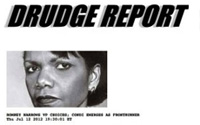How the Drudge Report, With Its Condoleezza Rice “˜Scoop,”™ Again Rules the Media
by Lauren Ashburn
The Daily Beast
July 15, 2012
His Condi Rice item went viral despite its utter implausibility. Lauren Ashburn on why the press is held captive by the conservative blogger”™s thinly sourced gossip.
 The headline screamed across the homepage of the Drudge Report: ROMNEY NARROWS VP CHOICES; CONDI EMERGES AS FRONTRUNNER.
The headline screamed across the homepage of the Drudge Report: ROMNEY NARROWS VP CHOICES; CONDI EMERGES AS FRONTRUNNER.
Matt Drudge””the shadowy, fedora-wearing Internet gossip machine who has boasted from day one that he is a conservative””crowed that his sources revealed former secretary of State Condoleezza Rice is at the top of the veep list. He even went so far as to punctuate the scoop with an exclamation point!
Bull. I”™m a good enough poker player to know a campaign bluff when I see one. The claim is so ludicrous as to be laughable, and Drudge must know it considering his reported alliance with the Romney campaign.
Yet in typical fashion, the media””knowing the claim had little basis in reality””went along for the ride. The Today show, Good Morning America, CNN, Fox, MSNBC, even The New York Times and The Wall Street Journal, along with plenty of others, took the bait and devoted countless minutes and column inches to the tale.
The speculation spread like wildfire across the web, with The Daily Beast and Politico taking the “scoop” and running with it, spicing up the summer”™s otherwise ennui-inducing campaign with titillating, but meaningless catnip journalism.
“The idea that Condi Rice, an African-American conservative woman could team up with a white-guy Mormon to take on an African-American, left-leaning Democrat is just too delicious for reporters to ignore,” says Frank Sesno, director of George Washington University”™s School of Media and Public Affairs and a former Washington bureau chief for CNN.
So why not do it? Why shouldn”™t news outlets take the opportunity to pooh-pooh the story as a way of driving clicks and ratings? Simple, Sesno says. If they don”™t, someone else will. “The question in newsrooms now is “if “˜so many have seen it, heard it, read it, tweeted it, how can we ignore it?”™”
Former New York Times reporter Steve Roberts, a columnist for the Los Angeles Times Syndicate, is critical””like others who covered news in the non-digital age””of the principles that guide too many websites: “We”™re not telling you this is true, we”™re just saying other people are reporting it.” He calls the process “highly unethical.”
“Redistributing the work of others is so easy and has become a form of news,” says Tom Rosenstiel, director of the Pew Research Center”™s Project for Excellence in Journalism. Rosenstiel adds reporting on another journalist”™s reporting raises serious questions about fact-checking someone else”™s anonymous sources. “When you post something because it is out there and can get you attention, traffic, even revenue, are you responsible if it is wrong?”
Apparently not. It”™s pretty obvious that most of those who picked up this story failed to vet it before blasting the claim to the world””or trumpeted it even if their own sources called the idea absurd. They know Drudge is a monster traffic-driver and that even if they ignore his tasty tidbits, their rivals won”™t.
Read the rest of this article here.
